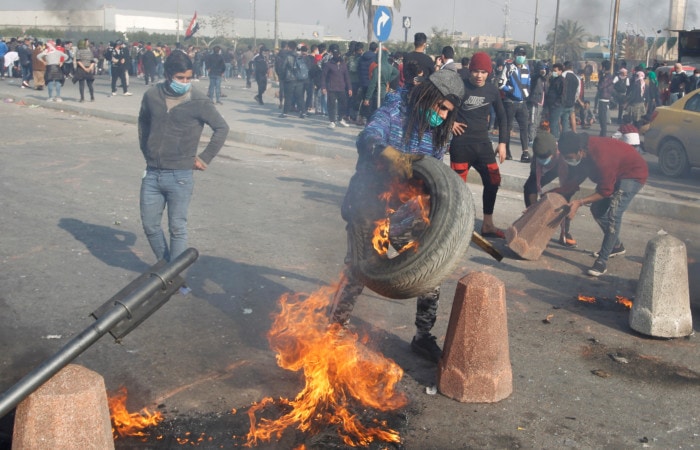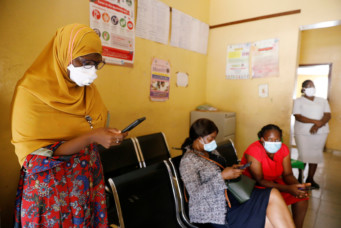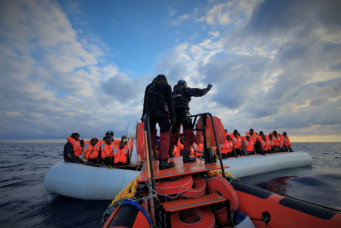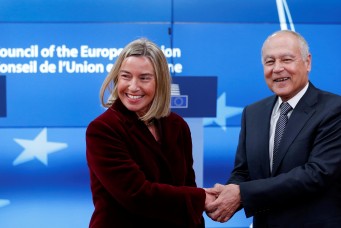The EU and the Med: Is Geography Still Destiny?
Europe needs to find ways of reinvigorating its relations with MENA countries to bring stability in its southern neighborhood and Mediterranean region.

The past decade has witnessed a sea change in relations between the two sides of the Mediterranean—southern Europe, and the Middle East and North Africa (MENA). From a high point in 2011, when the European Union backed the largely unsuccessful Arab uprisings in the hope of seeing a new democratic dispensation take root, its approach to the MENA region has changed fundamentally. Once a generally benign partner, with normative as well as economic attractions, the EU has retreated to the European trenches as the perceived twin threats of irregular migration and terrorism have come to dominate its stance. The mantra of its 2016 Global Strategy, that the EU’s own security is inextricably linked to what happens in the wider world, was to an extent aimed at the Southern Mediterranean.
This, together with resurgent authoritarianism in MENA after the uprisings, and the rise of populism in many European countries, has led to a much more cautious EU stance toward its neighbors. To reconfigure the late U.S. President John F. Kennedy’s famous adage, it is now more a case of “think not of what you can do for the region, but what the region might do to you.” This narrowing of European interest, added to U.S. disengagement not only from the MENA region but also, since the advent of the Trump administration, from Europe itself, has been one of the prime reasons why there has been an opening up of space for others, notably Russia and Turkey, to appear on the regional stage, and not always constructively.
At the time of writing, with most of the EU (along with much of the Mediterranean) locked down in response to the Covid-19 pandemic, the instinct to retreat to the laager is stronger than ever. While many EU leaders pay lip service to the fact that the pandemic is a global challenge—and if it is to be beaten at home Europe will need to match domestic programs with measures to quell it abroad—one is bound to wonder just how much energy and resources they will really devote to the overseas dimension.
So, this is not the most auspicious of times to peer into the crystal ball and consider the future of the European Neighbourhood Policy (ENP), the EU’s main vehicle for its political, trade, and development policies and financial cooperation with the ten states that comprise its southern neighborhood. But for all of the clouds overhead and on the horizon, the fact is that Europe simply cannot afford to turn its back on the MENA region. For one thing, the message of the EU’s 2016 Global Strategy still resonates today: Instability in the neighborhood, if not addressed, will in one way or another continue to threaten the European way of life at home.
A Region, and Relationship, Under Stress
Since 2016, the situation has, if anything, worsened. The war in Syria may be reaching its final stages, but a sustainable political solution is nowhere in sight; 40 percent of the population remains displaced, either internally or abroad; and there is a massive need for reconstruction of the country. Libya’s conflict also drags on, with the two sides at a stalemate. The prospects for a lasting peace in the Middle East have deteriorated even further, with the advent of the US “peace plan”, and the associated risk of Israeli annexation of Palestinian territory, something that could also have serious consequences for Jordan and for its peace treaty with Israel. Lebanon faces an acute political and economic crisis and additionally continues to struggle with the fallout from Syria. Egypt has been unable to quell terrorism in North Sinai. Finally, while violent extremism may have abated somewhat since the defeat of Da’esh, these conflicts and others, if they fester, can present opportunities for a resurgence of terrorism in the region and beyond, not least in Europe itself.
As far as Syria is concerned, the EU has been reluctant to respond to demands for reconstruction funding so long as the Assad regime refuses to make any meaningful political reforms or security guarantees for returnees and internally displaced persons. The regime may well use the pandemic to intensify pressure on Europe to change course, but there needs to be a quid pro quo before Europe can become involved.
Although EU institutions are becoming more involved in security matters and have in recent years developed some important capacities, notably in policing, border management, and maritime security, they are not yet seen as natural partners for conflict prevention or resolution by many MENA governments, especially those with powerful military establishments and intelligence services. The strengthening of the security state in the MENA region, whether overtly, as in Egypt, or more covertly elsewhere, has led to a gap in understanding. The obstacles encountered by the EU in deploying security experts to EU delegations in the region are a good example of this.
This begs the question of how the EU can be more effective as a security partner. There may be some improvements in the quality of future engagement as the EU and MENA states increasingly work together in operations such as naval coordination to address irregular migration, but until and unless a “European Army” emerges or democracy blooms in the MENA region, neither of which is very likely in the foreseeable future, these gains will probably be marginal.
Some EU member states do of course have longstanding relationships with MENA militaries and security institutions. Those ties certainly help, and indeed are fundamental, in cases where the EU decides to act as one. But where there is no effective common position, they sometimes work at cross purposes. For example, some member states continue arms sales to MENA countries, while others criticize these transactions for fueling regional conflict and endangering human rights. This particular situation is made worse by the fact common positions are not always respected. For example, in 2013 the EU decided to limit commerce involving items that could be used for “internal oppression” in the context of arms sales to Egypt. Differing interpretations by member states of what weaponry was covered by this provision, together with a lack of enforcement, have severely weakened the measure, not to mention the credibility of the EU in general.
Libya and Middle East Peace: Pitfalls and Opportunities for the EU
Divisions among member states have also hindered the European Union’s ability to act in a constructive manner in Libya. Even when the EU has come together to attempt to restore stability in the North African country, there are serious doubts about whether it can be effective. The new operation “Irini”, designed to police the United Nations arms embargo, leans toward controlling weapons delivered by sea, which puts the internationally recognized Government of National Accord (GNA) in Tripoli at a disadvantage vis-à-vis Khalifa Haftar’s rival forces, which obtain the lion’s share of their arms by air or land.
Among other things, Irini papers over the cracks in the divergent approaches of two major member states. On the one hand there is France, which de jure supports the UN peace process but de facto sees Haftar as a better bet for “stabilization”, especially in the south, where Paris worries about the consequences of Libya’s insecure border areas for its counterterror operations in the Sahel. On the other hand is Italy, which is mainly concerned about irregular migration and sees the GNA as a key partner for addressing this.
So long as these two key players are on different pages, Europe’s declared support for a political solution will be half-hearted in practice. Libya could be an opportunity for Europeans to raise their game when it comes to defusing conflict, however. The EU, under the leadership of its presidents and High Representative Josep Borrell, French President Macron, and Italian Prime Minister Conte, needs to unify its act in Libya and fully support the UN-led search for peace in word and deed. It has every interest in doing so, for it is Europe that pays the highest price of instability in Libya.
Neither of the two main Libyan players will be able to “win” militarily in the conflict. Moreover, the current stalemate, with its potential to spur a revival of migration crises, terrorism, and further suffering for the Libyan people and migrants who are hosted there, benefits no one except extremist groups, human smuggling gangs, and shady arms dealers. The Covid-19 pandemic adds new urgency to peace efforts, not least through its fallout for the oil trade which Libya depends on so heavily.
The second area in which the EU could quickly burnish its political credentials is in the Middle East peace process (for want of a better term). The U.S. “peace plan” and associated abandonment of any semblance of being an honest broker for peace have put the two-state solution, or perhaps more accurately, Palestinian self-determination, in dire peril. As Israel moves toward annexation of Palestinian territory, it is vital that the EU pushes back robustly.
Failure to do so would not only seriously harm relations with the MENA region as a whole and be a gift to extremists everywhere looking for new succor, but would also undermine the very essence of the Union, built as it is on respect for international law. If and when annexation proceeds, the EU needs to be ready to apply appropriate sanctions—the EU reaction to Russia’s annexation of Crimea in 2014 demands consistency here; to bolster its existing position and trade policy on illegal Israeli settlements; and to encourage those member states who have not already done so to recognize Palestine as a state. That may not make such a state real, but it will give some hope to a people who have been starved of it for far too long.
In the realm of diplomacy, it is doubtful whether any new peace initiative from Europe, or anywhere else for that matter, is feasible in the current climate—neither of the main parties in Israel are likely to engage, and this will probably be the case for years to come. However, the day will come when peace is back on the table, and this makes international protection of Palestinian rights and dignity all the more important.
Windows for Economic and Social Collaboration
Turning to economic and social priorities, the EU remains easily the most prominent investor and largest trading partner for all MENA countries. Shared economic interests between Europe and the MENA region have been boosted by the new gas finds in the Eastern Med, with the prospect of a welcome new source of energy that could help the continent reduce its dependence on Russian supplies.
That said, the appearance of Covid-19 has profoundly affected economic prospects everywhere. It is of course impossible to predict with any precision the impact of the pandemic, but it is clear that both sides of the Mediterranean are likely to be hit hard. In Europe, massive state-led domestic economic recovery efforts, whether by member states or EU institutions, will pile up sovereign debt, reduce fiscal space, and potentially squeeze aid budgets, thus jeopardizing Europe’s financial capacity to maintain assistance programs. While the southern neighborhood will continue to be prioritized, it is by no means clear that the level of funding under the ENP will be maintained, let alone increased. Even before the havoc wreaked by Covid-19, the ongoing EU budget discussions were becoming difficult due to the loss of a major net contributor through Brexit and other factors.
Furthermore, the pandemic’s negative effects on oil and gas markets could last for some time, meaning that MENA countries’ revenues from their own hydrocarbons and the capacity of Gulf Cooperation Council countries to support them financially could also be reduced considerably, at least in the short term. Just as serious, tourism, a mainstay of many MENA economies and a large source of employment, could remain depressed for some time as people in Europe and elsewhere take time to regain the confidence to travel again.
Any economic recovery from the crisis is going to depend critically on a revival of trade and investment, especially for Europe. It is here that the prospects for EU–Med relations might just be a little brighter, provided both sides bring a new injection of economic vision. The main trade initiative of the current ENP, the EU offer of a deep and comprehensive free trade area, has borne little fruit in the MENA region. Only two countries, Morocco and to a lesser extent Tunisia, are engaging seriously. There are many reasons for this, including the fact that the EU had been slow to provide further openings in key sectors for MENA countries.
On the other hand, countries like Egypt and Algeria have been rather skeptical of the EU’s efforts to further reduce trade barriers and tend to view trade through mercantilist eyes as a zero-sum game. They also cultivate a class of inefficient crony companies who jealously guard the protection and monopolies afforded them. As such, there is widespread suspicion among MENA governments of the “win-win” solutions touted by free traders.
Both sides need to change tack if trade and investment, which virtually all analysts agree is far below its potential, is to take off as it should. Europe should be less hesitant in its own offers, for example in agricultural trade, where the south enjoys a number of largely unrealized comparative advantages. At the same time, MENA countries should jettison the failed protectionist policies of the past. Some will argue that in the absence of serious political reform it is naïve to imagine that governments would be interested in such a move.
There are precedents, however. For example, the opening of the Egyptian economy during the last years of the Mubarak era produced a period of relatively high growth. Even if the failure to distribute that growth equitably was one of the factors behind the Egyptian revolution, a salutary lesson, that the economy responded so well to those policies showed that liberalization can produce significant benefits. The more recent experience of Morocco’s economic liberalization is also well worth considering. Anyone who has lived in the MENA region knows that there is no shortage of entrepreneurial skills and imagination among its people; the problem is mainly with their governments.
Europe is far and away the most significant international political and financial supporter of MENA civil societies, though efforts in the fields of rights and democratization have been tempered by the need to work with largely unsympathetic governments. That is not to say that such support should not continue. If anything, it should be expanded: apart from normative considerations, civil society is a crucial element in delivering public services across the region. Indeed, many of the EU-funded development programs could not function without it.
The other area of cooperation with real promise for the coming years is the fight against climate change. Mediterranean countries are particularly vulnerable to this challenge, and the EU has made climate change its top priority, notably with its new “Green Deal”. European financial commitments for renewable energy in the south, particularly through European Investment Bank loans and ENP grants for wind and solar projects, are already significant. As renewable energy costs continue to fall, and should oil and gas prices remain depressed, there is great potential for further investments of this kind, including from the private sector.
Addressing these issues will require stronger cooperation with other external players in the region, not least the Gulf Cooperation Council. Here, the new Euro–Arab summit forum, which was launched last year in Cairo and brings together the leaders of all Arab League and EU member states and institutions, could make an important contribution, provided it focuses on areas of common interest, such as economic development in MENA. But if it is to play an effective role, the parties will have to better prepare for future exchanges than they did for the first meeting.
Finally, one should not forget that the people-to-people aspects of the EU–MENA relationship, whether through the large Med communities residing in the EU or historic cultural ties, are as strong as ever. These are especially hard times, full of uncertainty for Europe, the MENA region, and beyond, but the case for re-energizing the European Union’s relationship with MENA countries has perhaps never been stronger. With the Covid-19 crisis preoccupying everyone, it is anyone’s guess as to whether the two sides will show the necessary leadership, vision, and wherewithal for such an enterprise. One thing is for sure: The status quo ante will not endure in the post-pandemic world, and reliance on old ways will be to the detriment of all.
James Moran is a Senior Fellow at the Centre for European Policy Studies in Brussels. He was formerly the EU Ambassador to Egypt from 2012 to 2016, EU envoy to Libya in 2011 and Ambassador to Jordan and Yemen in 1999-2002.
Read More



